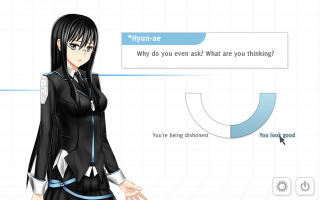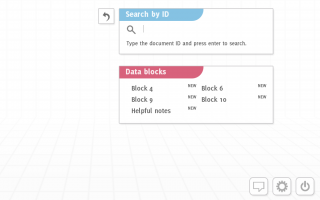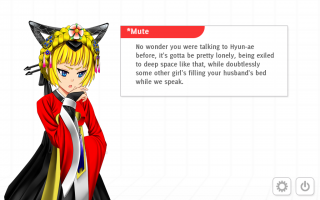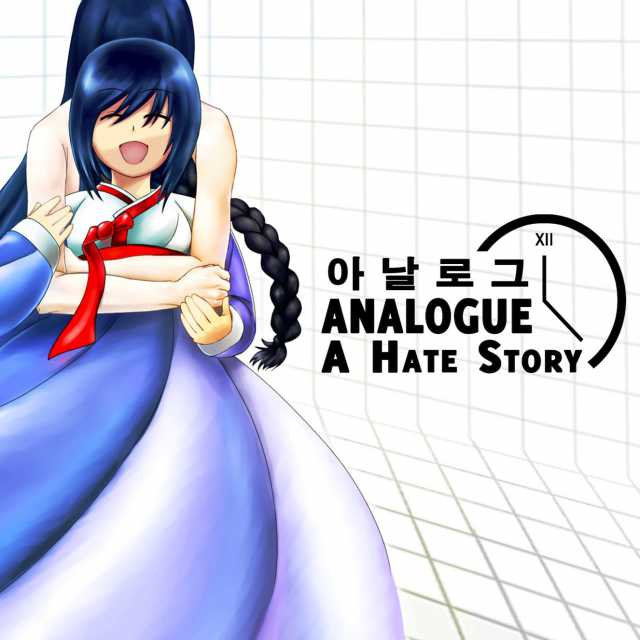Analogue: A Vocal Story
I can't pretend to actually know Christine Love as a person. We've never had lunch together. I've never actually sat down and chatted with her. I don't know what makes her tick. Beyond the fact that I know that she is a person that exists and creates stories presented in the adventure game format, I frankly don't have much of a clue about who she actually is. This is to be expected; it's how things are in a typical author-reader relationship. She does the writing and I do the reading, but we never once actually meet during the entire process. And yet despite that mutual anonymity, as I typed and clicked to make my way through her latest tale, I couldn't help but feel that I still got a bit of insight into the humanity behind her work. It is completely presumptuous of me to assume so. I'm fully aware of that. But it is to her credit as an author that I cannot seem to completely separate the words from the person who wrote them. Every good writer, regardless of their field, understands that one of the keys to connecting with a reader is to have a unique, perceivable voice and exploit it. Love's newest work, Analogue: A Hate Story, is evidence enough of that. You may not relate to all that she has to say and there are even things you may find disagreeable, but the sheer strength with which her game is able to naturally evoke such contemplation is testament enough to the power that her voice, even on its own, has in creating a distinct, narrative-driven game such as Analogue.

Love's voice is everywhere in Analogue. It's in the curious setting, an abandoned Korean space ship dubbed the "Mugunghwa" left idling for hundreds of years in space prior to your arrival. It's in the three main characters who drive the crux of the narrative, the ship's two female AIs and, by extension, you, the player. It's in the details that drive all of those characters, whether it's the reserved *Hyun-ae's love of cosplay, the brash *Mute's knack for gossip, or even the binary nature that, by way of circumstances, you are forced to conduct the entirety of your relationship with the two AIs. It's in the details that Love has lingering in the background and the ones that she deliberately neglects. It's even in the gameplay mechanics you have at your disposal; superficially akin to any number of visual novels due to its inherent linearity and art style, but in reality more similar to the text adventure games of yore, all the way down to the game's need for you to actually type on the keyboard. The only place where her voice isn't in full force is in Analogue's art and music assets, which were created with outside assistance. But even then, her voice shines through; pleasant though the artwork and sounds may be, they always, as they should, play second fiddle to Love as the author of the game and its text. They merely make manifest details her writing already brings forth in the mind.

I hesitate to talk about Analogue in more concrete terms like other games outside of its genre not because I am unable to do so, but rather because, unlike many of those other games, Love's work, as always, lives and dies on the one strength it was always designed to exhibit and that is the raw text. Without those words directly telling you the game's story as it was intended to be conveyed, there's the risk that something gets lost in translation between the game and the review. My words can never be hers and Analogue, like Digital and Don't Take It Personally before it, is a game that's all about her language. She is completely in charge of how her work is literally read and executed, if not otherwise interpreted. As such, it is best discussed minimally before playing through it. Perhaps all that I can safely disclose is that there are reasons the game takes place on a ship, that the game expects you to bond with AIs instead of actual humans, and that it has Korean names specifically everywhere you look. They all serve to give the game its own identity, even if it has deep familial resemblances to her other works. I suppose I can tell you that, and, the fact that the game will, in no uncertain terms, make sure you understand the themes and underlying ideas driving both the story and limited gameplay. Love's voice is so strong at times that it can lack some subtlety. But Analogue may very well not be what it is without that element.

Analogue, as of this writing, is priced at $15. I can't tell you how much value that might actually represent to you. Many other adventure games, especially those of the countless visual novel variety to which Analogue may well end up being compared, often come out free in English, either because they're translations of other commercial works or, in the case of ones such as the recently-released Katawa Shoujo, are community efforts designed to be freeware from the start. That precedence alone may be enough to scare off a lot of people. Whether it should or not is ultimately not my prerogative to say, although I will point out that few conventional novels are released for as cheap as Analogue is, let alone ones that come with additional artistic assets and expect some level of direct, personal input into the proceedings, even if they are inherently very limited. Still, that argument doesn't take into consideration the notion that games like Analogue are something of an anomaly. They fit into a variety of tropes and genres in purely mechanical terms while still somehow coming across as a very different product compared to the norm. It becomes difficult to assign a value at that point, especially a numerical one, and it's only all the harder without actually playing the game and experiencing its story firsthand.
But what should ultimately matter is that Love, once again, is among the rare minority of video game creators willing to discuss things like sexuality and the emotional limits of the human existence in unflinching, yet relatable terms, something that should be both applauded and cause for reflection. There are some very rare, somewhat mainstream examples, such as Persona 4, that do tread on similar narrative ground. But even games like that often require teams to make characters as good as a Kanji or a Naoto and in the end, they still can't come across feeling like the product of a single person's vision. That isn't an inherently bad thing, but just the reality that faces many other games that might attempt to discuss similar ideas. In contrast to that, modest outside help aside, Love and Love alone is responsible for how her own game has turned out. Whatever you like, whatever you dislike, and whatever moves you, if any of it does, the source of it is bound to lie on her. She is, once again, a mostly lone, albeit not completely isolated, trail blazer in this regard. And it all goes back to her voice. That singular voice, even when it masquerades as many, trumps everything and always keeps the whole show moving.
I came away from Analogue: A Hate Story mostly grateful. Here's a game that once again displays just how potent and effective a game can be when its creator is so singlemindedly devoted to getting its fundamental ideas right. However, whereas that tends to be true in games that are predominantly all action all the time, it's under thoroughly different circumstances that the principle remains true in Analogue. Indeed, in Analogue, this quality is almost entirely achieved through just the power of Christine Love's voice in the game's writing. Just as much, if not even more so than her previous works, this feels like a deeply personal game made from the only sort of worldview Love can only understand: her own. It is a deeply complex one, taking into consideration other viewpoints in ways that are apparent in much of the game, but in the end, Love wrote from the only standpoint she'll always know. And she wrote plentifully from that perspective. Analogue can be a touching game as a result, but it's also one where you can't help but see the author embedded within the words. Different reactions to different things from different people are bound to be par for the course to the extent that some might not even like what they read or play. Much like how Love can only write about what she knows, however, so too can I only do the same in this review. I, at least, am glad this game came along. Putting aside personal differences and trite issues (it's not like as though the work would be inherently better if I worked on it anyway), it is a successful demonstration of the power of pure authorship in a video game. There is no Analogue without Christine Love and it's that fact alone, even setting aside the quality of the storytelling, that justifies its existence.

10 Comments